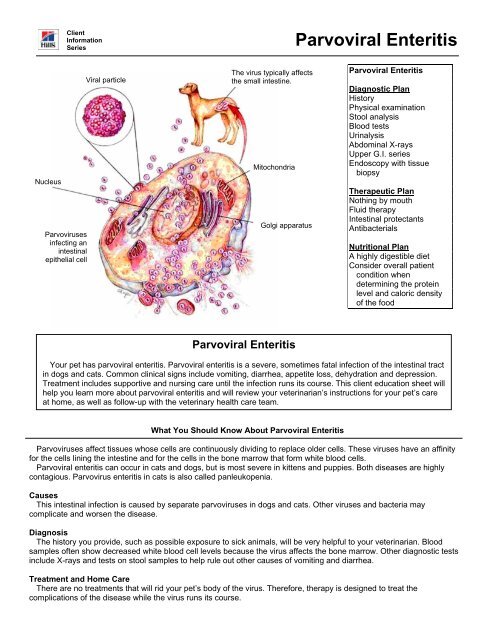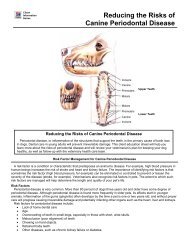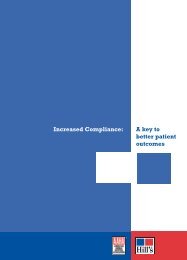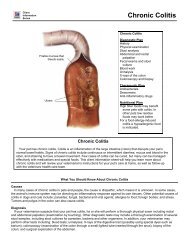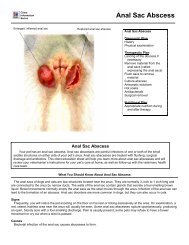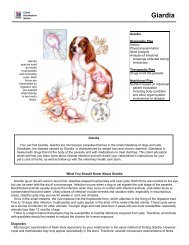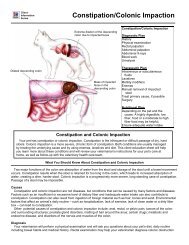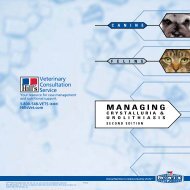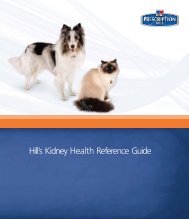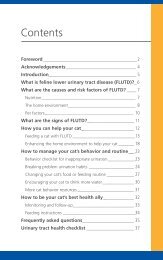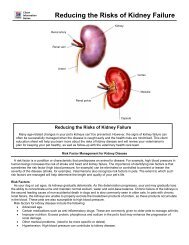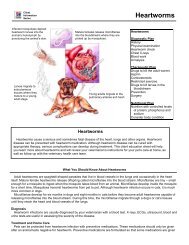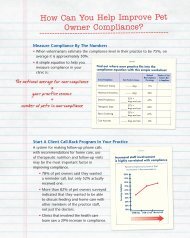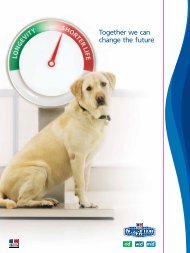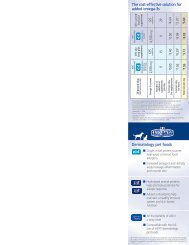Parvoviral Enteritis - HillsVet
Parvoviral Enteritis - HillsVet
Parvoviral Enteritis - HillsVet
You also want an ePaper? Increase the reach of your titles
YUMPU automatically turns print PDFs into web optimized ePapers that Google loves.
Client<br />
Information<br />
Series<br />
<strong>Parvoviral</strong> <strong>Enteritis</strong><br />
Nucleus<br />
Parvoviruses<br />
infecting an<br />
intestinal<br />
epithelial cell<br />
Viral particle<br />
The virus typically affects<br />
the small intestine.<br />
Mitochondria<br />
Golgi apparatus<br />
<strong>Parvoviral</strong> <strong>Enteritis</strong><br />
Diagnostic Plan<br />
History<br />
Physical examination<br />
Stool analysis<br />
Blood tests<br />
Urinalysis<br />
Abdominal X-rays<br />
Upper G.I. series<br />
Endoscopy with tissue<br />
biopsy<br />
Therapeutic Plan<br />
Nothing by mouth<br />
Fluid therapy<br />
Intestinal protectants<br />
Antibacterials<br />
Nutritional Plan<br />
A highly digestible diet<br />
Consider overall patient<br />
condition when<br />
determining the protein<br />
level and caloric density<br />
of the food<br />
<strong>Parvoviral</strong> <strong>Enteritis</strong><br />
Your pet has parvoviral enteritis. <strong>Parvoviral</strong> enteritis is a severe, sometimes fatal infection of the intestinal tract<br />
in dogs and cats. Common clinical signs include vomiting, diarrhea, appetite loss, dehydration and depression.<br />
Treatment includes supportive and nursing care until the infection runs its course. This client education sheet will<br />
help you learn more about parvoviral enteritis and will review your veterinarian’s instructions for your pet’s care<br />
at home, as well as follow-up with the veterinary health care team.<br />
What You Should Know About <strong>Parvoviral</strong> <strong>Enteritis</strong><br />
Parvoviruses affect tissues whose cells are continuously dividing to replace older cells. These viruses have an affinity<br />
for the cells lining the intestine and for the cells in the bone marrow that form white blood cells.<br />
<strong>Parvoviral</strong> enteritis can occur in cats and dogs, but is most severe in kittens and puppies. Both diseases are highly<br />
contagious. Parvovirus enteritis in cats is also called panleukopenia.<br />
Causes<br />
This intestinal infection is caused by separate parvoviruses in dogs and cats. Other viruses and bacteria may<br />
complicate and worsen the disease.<br />
Diagnosis<br />
The history you provide, such as possible exposure to sick animals, will be very helpful to your veterinarian. Blood<br />
samples often show decreased white blood cell levels because the virus affects the bone marrow. Other diagnostic tests<br />
include X-rays and tests on stool samples to help rule out other causes of vomiting and diarrhea.<br />
Treatment and Home Care<br />
There are no treatments that will rid your pet’s body of the virus. Therefore, therapy is designed to treat the<br />
complications of the disease while the virus runs its course.
Vomiting and diarrhea cause severe dehydration. Fluid therapy to correct dehydration and electrolyte and acid-base<br />
imbalances is critical for recovery. Whole blood may be given to increase the white blood cell count and supply antibodies<br />
against the parvovirus. Antibiotics help control secondary bacterial infections. Your veterinarian may also use medications<br />
to control vomiting and slow the movement of the digestive tract. Hospitalization for several days may be necessary to<br />
allow your veterinarian to provide good nursing care until the intestine begins to heal. During this time, your veterinarian<br />
will use fluid therapy and injectable nutrients to meet your pet’s needs.<br />
Home care consists of giving all prescribed medications and carefully following your veterinarian’s instructions for<br />
dietary management.<br />
<strong>Parvoviral</strong> infections can be prevented by routine vaccinations. If your pet has not been vaccinated against canine or<br />
feline parvoviral infection, you should discuss yearly vaccinations with your veterinarian.<br />
Nutritional Dietary Plan<br />
If your pet has had a parvoviral infection, your veterinarian may give you special feeding instructions. Pets that have<br />
parvoviral enteritis may benefit from foods that are highly digestible during the recovery process. Such foods minimize the<br />
need for complex digestive processes and are less irritating to the intestinal tract. Foods with these nutritional<br />
characteristics include Hill’s® Prescription Diet® i/d® Canine and i/d® Feline Gastrointestinal Health.<br />
After your pet’s recovery is complete, your veterinarian may suggest another dietary change. Nutrition is especially<br />
important to maximize growth and for proper development of the immune (protective) system in younger pets, such as<br />
those that present with parvoviral enteritis. Optimal nutrition should also reduce the health risks associated with feeding<br />
excess levels of nutrients such as calcium and phosphorus, which could cause skeletal problems, and excess calories,<br />
which could cause obesity. Foods formulated for maximum growth that avoid excess levels of harmful nutrients include<br />
Hill’s® Science Diet® brand pet foods.<br />
Transitioning Food<br />
Unless recommended otherwise by your veterinarian, gradually introduce any new food over a seven-day period. Mix<br />
the new food with your pet’s former food, gradually increasing its proportion until only the new food is fed.<br />
If your pet is one of the few that doesn’t readily accept a new food, try warming the canned food to body temperature,<br />
hand feeding for the first few days, or mixing the dry food with warm water (wait ten minutes before serving). Feed only<br />
the recommended food. Be patient but firm with your pet. This is important because the success or failure of treatment<br />
depends to a large degree on strict adherence to the new food.<br />
Presented as an educational service by<br />
Client’s Name:<br />
Patient’s Name:<br />
Medication(s):<br />
Home Care Instructions<br />
_________________________________________________________<br />
_________________________________________________________<br />
_________________________________________________________<br />
Nutritional Recommendation: ___________________________________________________<br />
Follow-Up Appointment: _______________________________________________________<br />
(Hospital Stamp Area Above)<br />
REGULAR VISITS WILL HELP OUR VETERINARY HEALTH CARE TEAM PROVIDE FOR YOUR PET’S BEST INTEREST.<br />
©2009 Hill’s Pet Nutrition, Inc.<br />
®/ Trademarks owned by Hill’s Pet Nutrition, Inc.


